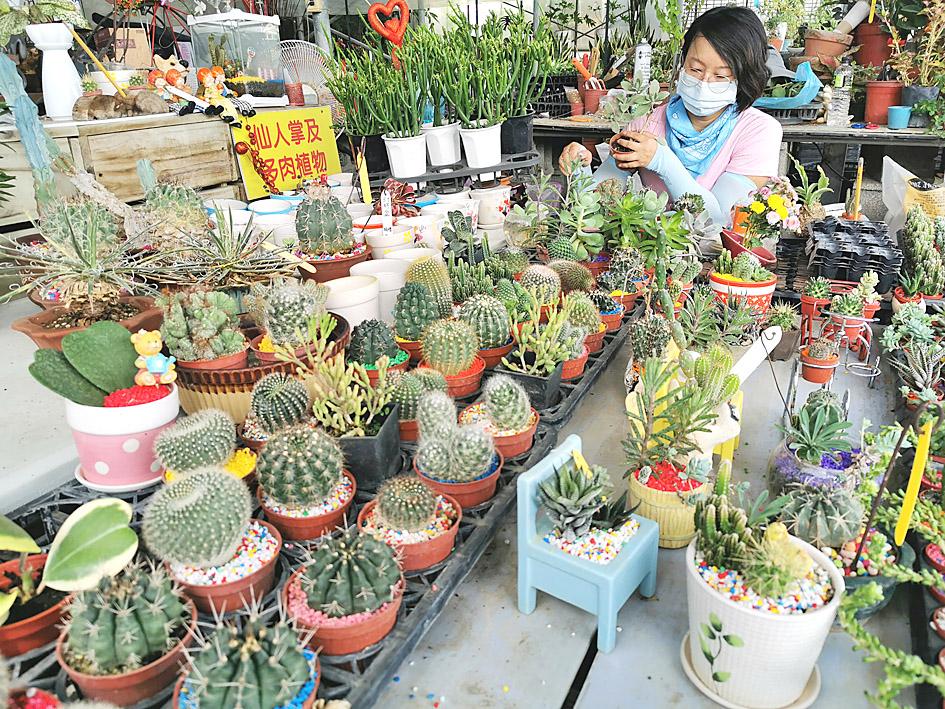Succulents are becoming more popular due to their resilience to drought and relatively little need for water amid an unusually dry year, an industry representative said.
Potted succulents have always been popular for their healing properties, but are now selling nearly 30 percent better than last year due to dry conditions, Huang Yi-pin (黃毅斌), chief of production and marketing at Cijia Fifth Street Floral Park in Tainan’s Gueiren District (歸仁), said on Monday.
A relatively dry season and a lack of typhoons have raised concerns over a drought until next year’s seasonal rains arrive in May, with the Water Resources Agency on Wednesday implementing phase-one water rationing measures in some areas.

Photo: Wu Chun-feng, Taipei Times
There are thousands of succulent varieties, with the most common belonging to the cactus family, Huang said.
Cacti come many fantastical shapes and can be used for many purposes, such as a modeling subject, to pair with other potted plants or for interior decoration, he said.
Other common succulents include aloe, the pencil tree, Lithops or pebble plants, and dogbanes that have flowers, but no thorns, Huang added.
Ghost plants with their striking rosettes and stonecrop perennials, such as Bryophyllum pinnatum, are also common houseplants, in addition to the popular “lover’s tears” scrambling succulent that belongs to the daisy family, he said.
The plants should be kept in a place with plenty of natural light and only need to be watered twice a month, although larger plants in pots that are at least 8cm in diameter can go four weeks without being watered, he added.
Aside from their medicinal uses as balms or ointments, succulents can also clean the air and absorb radiation, he said.
Huang also recommended that people try planting in a ball of moss or soil, instead of a pot, as it is more water-efficient, can be made easily and has an attractive decorative appearance.

A decision to describe a Chinese Ministry of Foreign Affairs statement on Singapore’s Taiwan policy as “erroneous” was made because the city-state has its own “one China policy” and has not followed Beijing’s “one China principle,” Deputy Minister of Foreign Affairs Tien Chung-kwang (田中光) said yesterday. It has been a longstanding practice for the People’s Republic of China (PRC) to speak on other countries’ behalf concerning Taiwan, Tien said. The latest example was a statement issued by the PRC after a meeting between Singaporean Prime Minister Lawrence Wong (黃循財) and Chinese President Xi Jinping (習近平) on the sidelines of the APEC summit

Taiwan’s passport ranked 34th in the world, with access to 141 visa-free destinations, according to the latest update to the Henley Passport Index released today. The index put together by Henley & Partners ranks 199 passports globally based on the number of destinations holders can access without a visa out of 227, and is updated monthly. The 141 visa-free destinations for Taiwanese passport holders are a slight decrease from last year, when holders had access to 145 destinations. Botswana and Columbia are among the countries that have recently ended visa-free status for Taiwanese after “bowing to pressure from the Chinese government,” the Ministry

HEALTHCARE: Following a 2022 Constitutional Court ruling, Taiwanese traveling overseas for six months would no longer be able to suspend their insurance Measures allowing people to suspend National Health Insurance (NHI) services if they plan to leave the country for six months would be abolished starting Dec. 23, NHIA Director-General Shih Chung-liang (石崇良) said yesterday. The decision followed the Constitutional Court’s ruling in 2022 that the regulation was unconstitutional and that it would invalidate the regulation automatically unless the NHIA amended it to conform with the Constitution. The agency would amend the regulations to remove the articles and sections that allow the suspension of NHI services, and also introduce provisional clauses for those who suspended their NHI services before Dec. 23, Shih said. According to

Minister of Labor Ho Pei-shan (何佩珊) yesterday apologized after the suicide of a civil servant earlier this month and announced that a supervisor accused of workplace bullying would be demoted. On Nov. 4, a 39-year-old information analyst at the Workforce Development Agency’s (WDA) northern branch, which covers greater Taipei and Keelung, as well as Yilan, Lienchiang and Kinmen counties, was found dead in their office. WDA northern branch director Hsieh Yi-jung (謝宜容), who has been accused of involvement in workplace bullying, would be demoted to a nonsupervisory position, Ho told a news conference in Taipei. WDA Director-General Tsai Meng-liang (蔡孟良) said he would